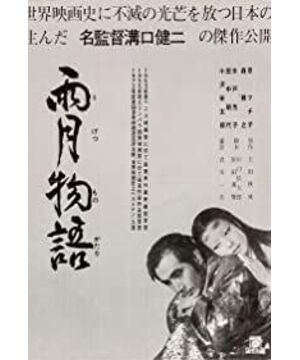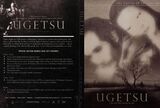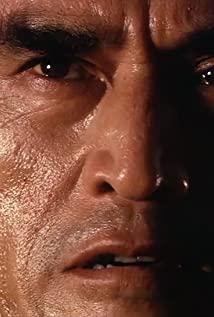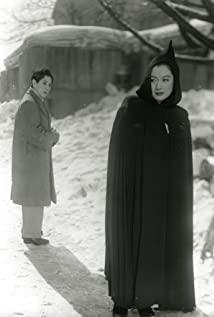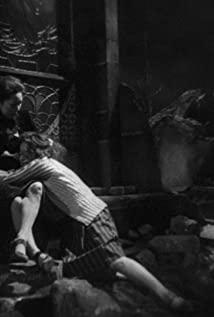"The Story of the Rain Moon" is a ghost drama directed by the famous Japanese director Kenji Mizoguchi, which was released in 1953. It has a frame of 1.33:1 and is a black and white sound film.
The film tells that in the war-torn era, Genjuro, who lived in the countryside, was addicted to selling ceramics to make a fortune in the war. Genjuro's brother-in-law, Fujibei, was extremely eager to become a samurai. Genjuro burned a batch of ceramics, just as a group of soldiers came to loot the village. Genjuro, his wife, Miyagi, son, Yuanichi, and sister, Abin and brother-in-law, Tobei, went to the city to sell porcelain. By the way, they escaped the war and took a boat. On the way, they met a dying boatman. Therefore, for safety, they sent Genjuro's wife and son back first, while Genjuro, Fujibei and Abin went to sell porcelain. When he was selling porcelain, Fujibei saw soldiers passing by. He picked up his purse and ran to buy armor and weapons. He wanted to join them. Genjuro fulfilled his contract to deliver porcelain to Wakasa, a female ghost who came to order porcelain, but was bewitched by her and indulged in women's lust, and stayed, while his wife was killed by defeated soldiers on the way home. Fujibei found out that he was promoted to the head of the enemy general in the battlefield. When he took his subordinates to go to prostitutes, he found that his wife, Abin, had become a prostitute. He immediately abandoned his armor and brought his wife home. Genjuro was awakened by a passing monk, repented, and ran home to reunite with his wife, only to learn the next day that his wife had passed away.
The film is based on two stories in the novel of the same name by Japanese Edo-era writer Ueda Akisari, and director Kenji Mizoguchi blends them into one. It is false to express fame and fortune with women's indecision and women's tragedies. Only home is the best theme. Genjuro pursues money, ventures away from home to sell porcelain at the juncture of the war, and then becomes bewitched by women and forgets his wife and children. Fujibei pursues fame and is keen to be a samurai, desperate to get the lord's appreciation. Genjurou's wife was killed on the way home because she wanted to sell porcelain. Because she was bewitched by women, she almost lost her life. Because she ran to buy armor and weapons to become a soldier, Fujibei's wife was assaulted on the way to chase him. , which warns us not to rush for quick success.
But the film has a certain gender discrimination. Why do men's mistakes cause women's tragedies and let women bear the burden. Men have a way to turn back, but women, like Miyagi, have to pay the price of their lives. Miyagi was killed, the female ghost Wakasa gave her sincerity but was abandoned, and Abin was violated. The three women in the play are undoubtedly tragic. On the other hand, Genjuro and Fujibei found that although they made mistakes, they were tolerated. And also gained fame and fortune.
The film uses a lot of foreshadowing, echoing before and after. When selling porcelain for the first time, the village chief warned that something would happen if this continued, and as expected, a series of things happened later. When the boatman encountered a dying boatman, Miyagi said that this was a bad omen. The song Wakasa sang was exactly the portrayal of Genjurou leaving after waking up from a dream. "The best silk and satin, the selected colors, will eventually fade..."
Long shots are used a lot in movies, one shot per scene, which has higher requirements for scene scheduling, and the design is also very delicate. When Genjuro came home from selling porcelain for the first time, the village head first came out of Genjuro's house, and then he panned the camera. Following Miyagi's footsteps, Genjurou also appeared. One shot completed the village chief's entrustment, and Genjurou returned home. narrative.
The use of percussion instruments in the movie casts a mysterious veil on the story, but the ghost elements in it are not like a ghost movie, but only borrow ghost elements. Just imagine, if Wakasa's identity is human, the plot can continue. Her identity as a ghost seems to be more like an excuse for Genjurou to cheat.
This is a film with many elements of Chinese ink painting, perhaps because it is a black and white film, and the composition of some pictures and the setting of some scenes are reminiscent of ink painting. For example, boating on the water, Genjuro fantasizes about the appearance of his wife when he buys clothes for his wife.
"The Story of the Rainy Moon" is a fable, emphasizing the preciousness of home, exposing the cruelty of war, and showing the pursuit of living and working in peace and contentment.
View more about Ugetsu reviews


